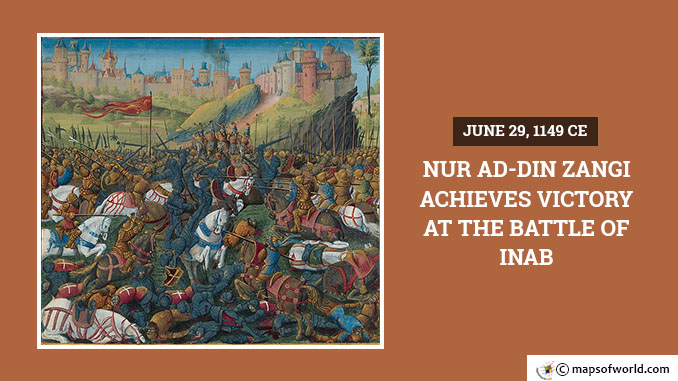The events which inform the current struggles in the Middle East are myriad, though one could easily argue the Crusades have as much influence as any other in the long timeline of the region’s history. On June 29, 1149, as the Second Crusade raged on, Nur ad-Din Zangi struck a blow for Islam that might have seemed small in his day but might be considered the first domino in the expulsion of the Christian armies from the region permanently by winning the Battle of Inab over Raymond of Antioch. Having taken control of the city of Aleppo upon his father’s death in 1146, Nur ad-Din went to work expanding his territory almost from the start. Setting his sights on the Crusader-held Principality of Antioch to the west, he launched attacks with the intent to reclaim what is today Lebanon, western Syria and southern Turkey. (He managed to capture a handful of castles in Syria during these first raids.) The Crusaders, still stinging from losing a swath of territory in the County of Edessa during the reign of Nur ad-Din’s father Imad ad-Din Zengi, launched a counteroffensive on Damascus in 1148. Channeling all his resources, Nur ad-Din helping to make sure the modern Syrian capital – ruled by his father-in-law, Mu’in ad-Din Unur – would remain in Muslim hands. Sensing opportunity, he planned a fresh attempt to conquer his neighbors in Antioch. Combining men from Mu’in ad-Din’s army with his own, Nur ad-Din swiftly moved his force of 6,000 towards the Orontes River with designs on snagging Harim. After securing the castle and the huge tracts of land under its control, the Muslims marched toward Inab and prepared for a siege. Raymond of Poitiers, Prince of Antioch, quickly gathered an army of his own to bolster those facing starvation at the hands of Nur ad-Din. Pulling together the soldiers at his disposal and forming an alliance with the Hashshashin of Ali ibn-Wafa, Raymond managed to muster some 1,400 men. Determined to fulfill his duty to those under his rule, the prince and his allies mounted their horses and rode toward Inab in order to relieve the besieged people. This would turn out to be a fatal error. Nur ad-Din, receiving reports of Raymond’s force camping in an exposed area, suspected a large Crusader army would be lying in wait nearby. Unwilling to take the bait, he sent his spies further into the field to gather more information. When they returned without finding anything further, Nur ad-Din moved his army to encircle Raymond’s camp under the cover of darkness. The morning of June 29th would turn out to be Raymond’s last. The Muslim army swept in to destroy their Christian counterparts, producing near-total destruction. The Prince of Antioch, refusing the chance to escape the field, fell by the sword – just as most of his men would. With little in the way between Inab and the Mediterranean Sea, Nur ad-Din moved to the west with little hesitation. He would attempt to conquer Antioch itself, but fail due to the resolve of the Raymond’s mourning wife Constance and Patriarch Aimery of Limoges. Undeterred, Nur ad-Din soon captured the remaining territory by traveling along a trade route, eventually bathing in the Mediterranean as a symbol of his supremacy. Regarded as a hero by his fellow Muslims, Nur ad-Din would go on to solidify his claim to the throne of Aleppo and kingdom of Damascus. Within five years, he had laid a foundation for constant war between the Crusader states such as Edessa and Jerusalem, while imposing his own theocratic rule upon the territory under his control (he often expelled Shiites as heretics while respecting the Christians under his rule). Highly regarded as a statesman by the Europeans despite his wars against them, he remains a mythic hero to this day.
June 29, 1149 CE – Nur ad-Din Zangi Achieves Victory at the Battle of Inab
The events which inform the current struggles in the Middle East are myriad, though one could easily argue the Crusades have as much influence as any other in the long…
767
